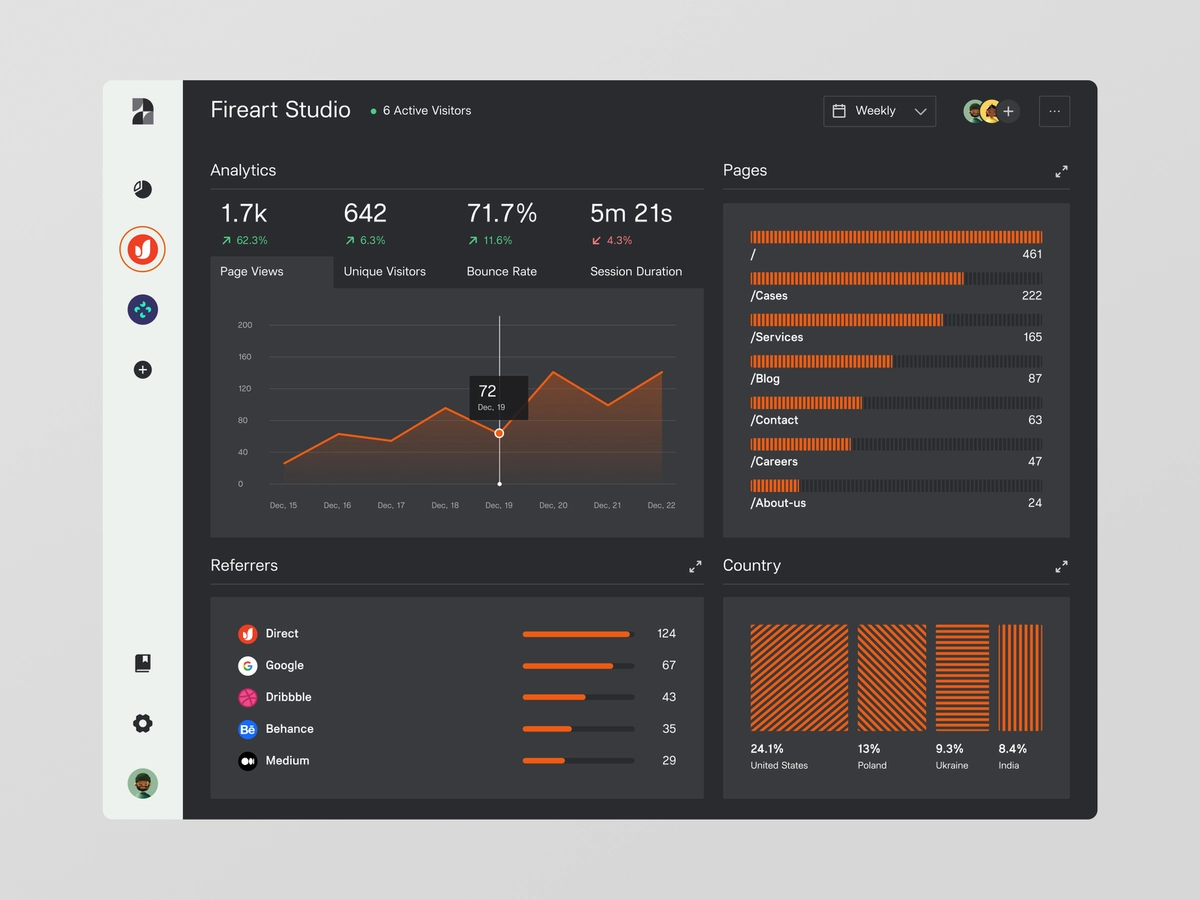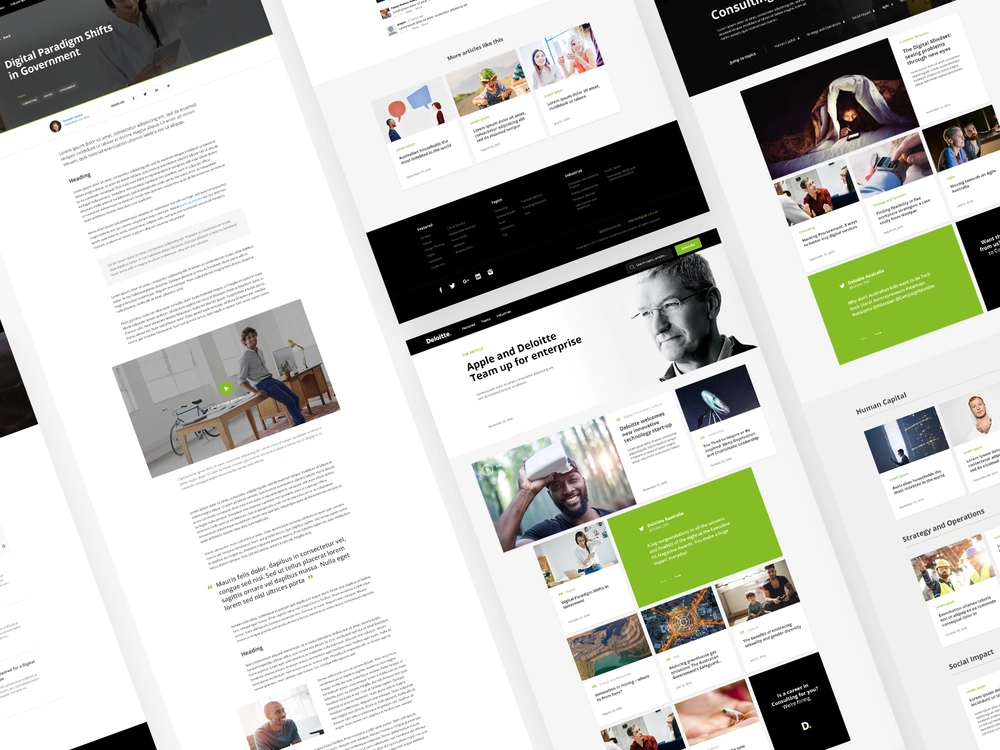If you are choosing between PwC vs. Deloitte, take our congratulations. Whether you’ve been offered a position in either or picking one as your vendor, you are at the top of the market. Consulting on management, finance strategy, or technological investment is one of the most lucrative industries. In 2022, the management consulting sector generated $329 billion in total revenue in the US market, with a growth of $100 billion in value over the last decade.

The largest and most well-known consultancy firms are often referred to as the Big 4: these are Deloitte, KPMG, PwC, and EY. While all these organizations provide high-quality consultancy services across various industries, in this article, we will focus on two firms with the highest revenue in 2022 — PwC vs. Deloitte.
What makes PwC and Deloitte so attractive, aside from competitive salaries and trusted position on the market? And is PwC better than Deloitte? Let’s compare how these two consulting behemoths rank against each other. This article will help you determine which firm performs better and is the best career choice.
PwC vs Deloitte: Overview

Source Statista
PricewaterhouseCoopers (PwC) and Deloitte offer various services, including audit and assurance, consulting, tax, and advisory services.
PwC is known for its strong expertise in finance. Deloitte has a large team representing it worldwide and focuses on technology and innovation.
Let’s explore the story behind each firm, their standing in various industries, and factors contributing to a high reputation among clients and answer the question: Is PwC better than Deloitte?
PwC: Overview
Established in 1998, PwC was born through the merger of two major accounting firms, Price Waterhouse and Coopers & Lybrand. Although it might seem that PwC entered the market recently, both founding companies track their history from the mid-19th century.
The newly created firm became one of the largest professional services brands in the world. Headquartered in London and with offices in over 150 countries worldwide, PwC offers a wide range of services, including audit and assurance, tax, and advisory services. In 2019, PwC was recognized as a leader in the Digital Product Experience Agency by the Forrester Wave.
In 2023, PwC won ‘2023 Digital Innovation of the Year’ at the International Accounting Forum & Awards. The jury has recognized PwC’s AI capabilities for auditors: predictive analytics, AI-assisted financial statement disclosure checking, and AI-enabled search functionality.
In addition to finance and management consulting, PwC has a significant presence in the technology, media, and telecommunications sectors. It has been investing in the best talent in innovation and digital transformation to provide top-notch consulting services. Its expertise covers artificial intelligence (AI), cloud computing transformation, and blockchain. Moreover, PwC’s involvement in the telecommunications sector extends to consulting and advising telecommunications websites, leveraging their expertise to enhance digital strategies and optimize online platforms for telecom companies.
PwC is also focused on expanding its presence in sustainable development and the environmental, social, and governance (ESG) industry. A primary research and advisory firm, Verdantix, named PwC a global leader in ESG services for businesses. Professionals from PwC navigate their clients through equitable, transparent, and sustainable strategies for business growth.
PwC has a huge network of offices in the Americas, Europe, and Asia. There are about 800 offices and partner companies across the globe. The company is focused on delivering high-quality services and building long-term relationships with its clients. At the same time, PwC invests in its talents, contributes to local communities, and discovers how cutting-edge technology can find its place in the ever-changing business landscape.

Deloitte: Overview and Experience
Deloitte is one of the largest professional services firms in the world and has a rich history dating back to 1845. The firm was initially established in London as an accounting firm. Over time, it has grown to offer a wide range of services, including audit and assurance, tax, consulting, and advisory services. The full legal entity name — Deloitte Touche Tohmatsu — tells the story of three leaders in consultancy who recognized the importance of a worldwide practice and merged to form Deloitte in 1989.
Deloitte has a robust global presence, with 700+ offices in over 150 countries and a focus on technology and innovation. The firm is determined to harness the potential of emerging technologies to offer innovative transformation strategies in multiple industries, e.g., financial services, healthcare, energy, and government.
Experts from Deloitte apply environmental, social, and governance (ESG) regulations and research in their auditing services to promote sustainable business practices among their clients. The firm is committed to diversity, equity, and inclusion (DEI) practices and supports the growth of its employees. For this purpose 2011, Deloitte opened its Leadership Center (often called “Deloitte University”).
Deloitte is #24 on the Fortune 100 Best Companies to Work For list in the United States. It is listed in the top ranks of employers for women, LGBTQIA+, and other underrepresented minorities.

Today, Deloitte is one of the largest professional services firms in the world. Its team of over 330,000 professionals worldwide helps companies navigate the complexities of the global business landscape.
Here is the table to sum up the key facts about both companies.
| PwC | Deloitte | |
| Founding year | 1998 | 1845 |
| Headquarters | London, UK | London, UK |
| Geographical expansion | 152 countries | 150+ countries |
| 2022 global revenue | $50.3 billion | $59.3 billion |
| 2023 VAULT Accounting Top 25 | 1st | 2nd |
| 2022 VAULT Most Prestigious Consulting Firms | 6th | 4th |
| Industries Served (mainly) | Consumer markets, Energy, Financial Services, Private Equity, Health industries, Industrial products, Engineering and construction, Law firm services, Technology, media and telecommunications | Consumer (Automotive, Consumer Products, Retail), Transportation, Hospitality & Services, Energy, Financial Services,
Government & Public Services, Life Sciences & Health Care, Technology |
Deloitte vs. PwC: Revenue
To answer the question “Is Deloitte or PwC better?” we should consider their annual revenue. This metric is growing for both companies despite setbacks created by the COVID-19 pandemic. Last year was particularly successful for them.
For example, in 2022, PwC surpassed the $50 billion mark and boasted $50.3 billion in annual revenue for the first time. The primary revenue generators were audit, consulting, and tax and risk assurance.
However, Deloitte’s results are even more impressive. The firm’s global revenue increased by 19.6% from $50.2 billion in 2021 to $59.3 billion in 2022. The company’s financial services accounted for almost a third of this figure, while consumer services and technology, media, and telecom (TMT) also grew.
The companies demonstrated resilience despite the pandemic’s challenges and kept the upward trend.
| Year | PwC | Deloitte |
| 2022 | $50.3 billion | $59.3 billion |
| 2021 | $45.14 billion | $50.2 billion |
| 2020 | $43.03 billion | $47.6 billion |
Source: Statista
Deloitte vs. PwC: Services
Deloitte and PwC come from the “Accounting Big 4”, meaning their main business is accounting, audit, and financial consultancy. Yet, over the years, they’ve become way more than that. Today, both offer a range of services for businesses worldwide.
Let’s examine the focus of each company.
Deloitte Services
Deloitte is known for its expertise in technology and innovation, with a strong focus on emerging technologies. The firm also positions itself as a proponent of environmental, social, and governance (ESG) principles in business process building.
Deloitte’s range of financial and financial modeling services is among the largest. Deloitte is a trusted adviser to middle-market companies on Mergers and acquisitions (M&A) and investment banking.

PwC Services
PwC has a strong presence in the financial services sector and has been involved in many high-profile audits and certified consulting projects for major financial institutions. Consultants from PwC have significant expertise in the technology, media, and telecommunications (TMT) sector and can advise a company about an innovative strategy.
PwC’s financial modeling services can provide private equity firms with a valuable resource for understanding and managing financial risks and making more informed investment decisions. The Digital and Forensic Investigations team at PwC is also one of the global industry leaders.
PwC vs Deloitte: Consulting
While both PwC and Deloitte offer similar services, there are some differences in their focus areas. To begin with, let’s consider the rankings of both companies in terms of their consulting and accounting expertise.
| PwC | Deloitte | |
| Vault’s Most Prestigious Consulting Firms (2023) | 6th | 4th |
| Vault’s Top 25 Accounting Firms (2023) | 1st | 2nd |
PwC Consulting
PwC has strong expertise in the financial services sector. It was ranked 1st in the Vault’s 2023 Top 25 Accounting Firms and 6th in the Vault’s Most Prestigious Consulting Firms rankings.
PwC also has a reputation for a data-driven approach to consulting, relying on rigorous research and analysis to support its recommendations. The firm has a strong presence in financial modeling.
Deloitte Consulting
Deloitte has a broader focus and is known for its technology, innovation, and sustainability expertise. Deloitte is renowned for its more creative and innovative approach, using design thinking and agile methodologies to help clients solve complex problems.
Deloitte strongly focuses on sustainability and environmental, social, and governance (ESG) issues and helps companies develop and implement sustainable business practices. PwC also has expertise in this area, but Deloitte is widely recognized as a leader in the field.
The Vault ranked Deloitte 2nd in the 2023 Top 25 Accounting Firms ranking and 4th in the Most Prestigious Consulting Firms list.
Deloitte vs PwC: Industries
PwC and Deloitte serve a wide range of industries, but there are differences in the domains where each firm has the most vital expertise.
PwC Industries
PwC focuses on financial services and has cooperated with major financial institutions. For example, PwC has worked with HSBC on many projects and recently retained the most valuable audit contract with HSBC on the London Stock Exchange.
PwC also has a significant presence in the technology, media, and telecommunications (TMT) sector and advises companies on innovation and digital transformation issues. Not surprisingly, SAP, Oracle, Salesforce, Microsoft, and AWS work with PWC.
Deloitte Industries
Deloitte is known for its expertise in technology and innovation, sustainability, and the ESG industry. For example, Deloitte has worked with Microsoft on various projects, including cloud computing and artificial intelligence technologies.
Deloitte helps companies develop and implement sustainable business practices. For example, the company collaborated with Dow Chemical. They recently helped prepare the World Economic Forum’s Manufacturing for Growth project report.
However, if you are looking for product design and software development services, then it is better to consult a digital product agency.
PwC vs Deloitte: Tax Services
PwC and Deloitte offer complete services, including preparing and filing tax returns for individuals and businesses. They have large teams of tax professionals with diverse expertise. Their tax services involve helping clients minimize tax liability and increase after-tax returns.
No matter the location, tax specialists are constantly updated on their respective countries’ latest tax laws and regulations and use advanced tax planning software to support clients in making informed decisions.
PwC and Deloitte help clients manage cross-border transactions in a tax-efficient manner. Both have teams of transfer pricing specialists skilled in negotiating with tax authorities and resolving disputes.
Deloitte vs PwC: Corporate Responsibility
You can better evaluate Deloitte vs PwC benefits by looking at their values and community engagement. Both professional services firms prioritize excelling in the latest technological trends or private consulting services and work on projects that impact the public.
PwC is famous for its collaboration with the United Nations. It was one of the founding partners of The UN Women HeForShe IMPACT 10x10x10 Initiative and developed an online course on unintentional gender prejudice in the workplace.
The company is dedicated to reducing its environmental impact and promoting sustainable business practices. The firm has many initiatives to reduce its carbon footprint, and it helps clients adopt sustainable practices as well.
Deloitte’s social impact initiatives were only sometimes successful. Recently, the company built a website to control scheduling, stock, and reporting for COVID-19 vaccination in the US. The Center for Disease Control and Prevention (CDC) awarded a $44 million contract to develop the universal county-wide system. However, it did not function properly and caused criticism.
Meanwhile, when it comes to corporate responsibility, both firms are committed to driving societal change and promoting environmental sustainability. All employees, from junior consultants to senior management, participate in volunteer activities promoting free training for youth, women empowerment in corporate settings, and decreasing carbon footprint.
So, is Deloitte better than PwC? They are similar, which results in positive neck-to-neck competition even in spheres beyond classical finance consulting.
PwC vs Deloitte: Culture
Is PwC or Deloitte better in terms of working culture? It depends on the specific office and even the team you work with. Yet, both firms value their employees highly and commit to creating a positive and supportive work environment. However, there are differences in their working cultures that may be important to consider.
Here are some facts that describe both companies as employers.
| PwC | Deloitte | |
| Number of employees | 327,947 | 415,000 |
| Fortune 100 Best Companies to work for (2022) | 63rd | 24th |
| World’s Best Workplaces (2022) | – | 7th |
| Great Place To Work’s Best Workplaces for Parents (2020) | 5th | 6th |
| Fortune Best Workplaces for Women (2022) | 86th | 16th |
| Fortune Best Workplaces in Consulting & Professional Services (2022) | 18th | 6th |
| Brand Finance World’s Top 500 Most Valuable Brands (2022) | 43rd | 54th |
PwC Culture
PwC is known for its strong commitment to work-life balance and a focus on employee wellness. The firm offers flexible work arrangements and has a supportive environment that allows employees to take time off when needed. PwC also strongly emphasizes training and development and invests in helping its employees grow professionally.
Last year, PwC hired 5,856 graduates across the UK, and 1,418 of them joined through the special graduate, school, and college programs.
To meet the DEI standards, in 2020, PwC established the Staff Diversity Council to shape the firm’s inclusion strategy, and it paid off: PwC was named in the Top 10 Inclusive Employers or Companies 2023 by the British LGBT Awards 2023. PwC ran a Black Talent in Business program and an ESG internship program.
Deloitte Culture
Deloitte is known for its fast-paced and results-driven culture. The firm is focused on delivering high-quality work and meeting client expectations, and employees are expected to work hard and perform at a high level.
In addition to high performance, Deloitte also emphasizes collaboration and inclusion. GLOBE, Deloitte’s LGBT+ network, is active in the UK, US, Netherlands and Australia. Other countries have their own initiatives, such as Canada’s LEAD network. Many countries also have networks to make minorities feel more at home, like the Cultural Diversity Network in The Netherlands and many award-winning programs in Canada and the US aimed at non-native professionals, veterans, and other minorities.
Unlike PwC, Deloitte encourages relocating its staff members, delivering the right team with the right skills where clients need it the most. Thus, a lot of experts at Deloitte have international experience.
PwC vs Deloitte: Employee Ratings
PwC and Deloitte are among the most desired employers, either for university graduates or junior and middle-level specialists aspiring to build their careers in the consulting industry. According to Glassdoor, this is how their employees evaluate their experiences with these companies.
| PwC | Deloitte | |
| Overall Score | 4.0 | 4.0 |
| Work-life Balance | 3.4 | 3.4 |
| Compensation and Benefits | 3.4 | 3.6 |
Source: Glassdoor
PwC Employee Ratings
PwC reports that 86% of their employees are proud to work at the company, and 79% would recommend PwC as a great place. The company expanded its global team in 2022, with over 32,000 new jobs created, but 2023 came with a hit. PwC couldn’t avoid the fate of most multinational companies and announced layoffs, with 600 jobs being cut in their UK business.
The employee review on Glassdoor reveals that the firm is ranked 4.0 out of 5.0, with a 3.4-point score for work-life balance, compensation, and benefits. Written reviews indicate that the company has a fast-paced but supportive environment.
Deloitte Ratings
According to Glassdoor, Deloitte is also ranked 4.0 out of 5.0, with a 3.6-point score for compensation and benefits and 3.4 for work-life balance. Past and current employees have a high opinion of the company and write that it offers opportunities to pursue exciting projects.
However, many reviewers also highlight pressure at work and high expectations from senior management. The daily tasks involve unnecessary paperwork, while promotions are determined not only based on performance but also on budget restrictions.
Deloitte also joined the army of layoffs in 2023, with 1200 jobs in financial consultancy eliminated in May and, more recently, 800 jobs being cut from the UK offices.
PwC vs Deloitte: Salaries
The salaries of Deloitte and PwC employees depend on several factors, such as job role, experience, location, and performance. Deloitte or PwC which is better in terms of pay? On average, salaries at Deloitte are slightly better than at PwC, and both companies offer competitive compensation packages.
According to Indeed.com, an audit associate at Deloitte in the US gets $65,000 annually, while a similar position at PwC yields $54,000. A starting analyst in Deloitte UK gets £34,000 per year, while a specialist in the same place at PwC earns £31,000. Overall, Deloitte’s salaries are slightly higher than PwC’s.
| PwC | Deloitte | |
| Average Consultant Salary (in the US) | $60,000 – $80,000 / per annum | $70,000 – $90,000 / per annum |
Clients of Deloitte and PwC
Deloitte and PwC have some of the world’s most renowned companies among their clients. These vary from development companies in Europe to growing startups in Southeast Asia. Here is an overview of organizations that turned to PwC and Deloitte for their services.
PwC Clients
PwC serves 84% of Fortune Global 500 companies and top-rated firms across five continents. 28% of PwC’s clients come from the financial services industry, while 17% are from industrial manufacturing and consumer markets.
Some of PwC’s significant clients include Bank of America, Goldman Sachs, IBM, Ford Motor Co, Dell, Exxon, etc.
Deloitte Clients
Deloitte focuses on helping clients deal with changing consumer patterns, developing new business models, and boosting efficiency with the help of digital tools.
Deloitte’s most prominent clients are Morgan Stanley, Berkshire Hathaway, GM, Boeing, and Procter & Gamble. In the past, Deloitte also worked with Coca-Cola, Walmart, Johnson & Johnson, and major telecommunication companies such as AT&T, ExxonMobil, and Verizon.
PwC vs Deloitte: Which is Better?
PwC and Deloitte have an impressive track record of successful collaborations and projects. Both consulting firms are highly respectable in the spheres of audit, financial strategy, management, and tech consulting. Junior professionals would also find joining one of the organizations a rewarding experience and an important career milestone. So, which is better: PwC or Deloitte?
Based on recent rankings and performance metrics, Deloitte has a slight advantage over PwC. The company is more prominent, generates higher annual revenue, and generally offers a higher salary. Deloitte employees value the company culture and benefits that it provides despite the competitive atmosphere.
PwC is also growing steadily, constantly expanding its workforce and investing in talent training. The company is more oriented towards financial and management consulting while developing its tech and media consulting expertise.
Although Deloitte is more engaged in government-funded projects, PwC is active in community and social development projects. Whether you choose PwC or Deloitte, both companies are oriented towards improving the experience of their employees and emphasize the values of diversity and inclusion.
Conclusion
It’s hard to say which is better: Deloitte or PwC, as the companies go neck-and-neck in most spheres, and in others, they split leadership. A very rough assessment to give is that PwC is better for audits, and Deloitte is better for consulting. (In product development, Fireart.studio is still your top player.) When it comes to being an employee, look at your office’s team and the company promotions policies.
We hope this article offered you a comprehensive view of the Deloitte vs PwC comparison. To determine which would better fit your company’s needs and professional goals, pay attention to the experience PwC and Deloitte have in your particular industry, market, and location, as well as financial considerations, to make a reasonable decision. You can also check our Accenture vs Deloitte comparison.
On the global level, Deloitte is an industry leader based on its performance and expertise across multiple industries. However, PwC still has the potential to catch up with its competitors in the upcoming years if it keeps its standards high and builds its reputation.
If your company grows and is ready to scale to the next level, outsourcing your product and outstaffing IT development can be exactly the solution you are looking for. If you are looking for the best deals, you may want to try outsourcing to Poland, Ukraine, or Eastern Europe. These countries have a large pool of skilled developers and some of the best prices on the market.
FAQ
Is Deloitte better than PwC?
At present, Deloitte is the leading company globally, taking into account its performance and professional record across different industries. Nevertheless, PwC still has the chance to close the gap with Deloitte in the future.
How hard is it to get into PwC?
Getting a job at PwC can be challenging, as the firm attracts a large number of applicants. The difficulty level in getting a job at PwC can depend on many factors, such as the specific role you are applying for, the location, and the state of the job market.
Who are Deloitte’s most significant competitors?
Deloitte’s biggest competitors are other large professional services firms from the Big 4 group: EY, KPMG, and PricewaterhouseCoopers (PwC).




















